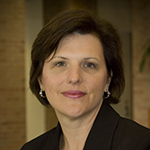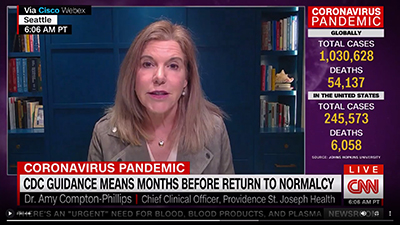April 20, 2020

They have had to adapt and implement crisis communications strategies and tactics in the throes of a pandemic in order to keep the public informed about the threat of the virus and where and how to get care, and their far-flung colleagues in the loop on changes in policies, procedures and care protocols.

Catholic Health World's Lisa Eisenhauer posed the same questions, separately, to communications leaders at two Catholic health systems with hospitals in parts of the nation that have been especially hard hit by the pandemic. Orest Holubec is senior vice president/chief communication officer at Providence St. Joseph Health, based in Renton, Washington. The system operates in seven western states. Catherine Harrell is chief marketing officer for Franciscan Missionaries of Our Lady Health System based in Baton Rouge, Louisiana, with facilities in Louisiana and Mississippi. Here's what they had to say:
How is your system communicating with the public about novel coronavirus and related health services?
Holubec: We have a number of channels through which we communicate to the public. One is earned media and ensuring that we get our credible spokespeople on cable news. We had the first identified case (in the U.S.) of coronavirus, of COVID-19, at Providence Regional Medical Center Everett Hospital in Washington, and so we've gotten a lot of attention because of that. What we always try to do is ensure that we have the most reliable information during times of crisis, and a pandemic certainly qualifies for that. We don't look for perfection, we just look for reliability, because minutes matter.

Another big channel is social media. We have a lot of followers on our social media channels and we're using those channels to get reliable, useful information with a call to action out to the public. We're doing that both in and outside of our footprint. So, it's not just about the communities we serve across the seven states as Providence St. Joseph Health, but also getting the word out across the country.
Harrell: We have taken a very proactive and open stance for communicating with the public about what is going on across our organization and how we are handling and continue to prepare for this pandemic. We are very fortunate to already have great working relationships with many local market media outlets that have allowed us to be a trusted voice in providing public information. We also have a very engaged following on our social media channels. We began communicating in advance of cases making their way into our health care regions.
In Baton Rouge, physicians made daily media appearances on numerous TV stations, answering viewer-submitted questions and reiterating that the public can stop the spread of this virus. Across markets, content was created to be shared on social media including blogs and infographics to answer the public's most requested information. We also have a website with resources dedicated to COVID-19 including all created content and information regarding our visitation policy.
Does your communications with the public cover sensitive topics such as the triage process and ventilator allocation in the event of shortages?
Holubec: We have active conversations internally about when and how to communicate sensitive information. We have an emergency operations center that meets a daily, and that includes clinical staff, communication staff, operations staff. And then we have a 7:30 call every morning with about 300 people across the seven states. And then we have a huddle with our communication team. We have about 50 or 60 of our team of 100 across the seven states that participate daily. And we talk through how and when to communicate the information we learned from those two calls.
We're all learning as we go along, but the cadence was put in place quickly early on and has been really effective for us as a communication team to have the information that we need to keep the public informed — and more important, to keep our caregivers informed.
Harrell: We want to be forthcoming without contributing to anxieties or concerns either with our workforce or the communities we serve. We have not yet been asked about crisis standards of care and expect those questions to be answered by state officials as these are agreed standards statewide. Our established processes are serving us well. For example, our ethicists and ethics committees have been involved in the review of these standards and the education of boards.
How are you handling the stream of media inquiries?
Holubec: We have one of the best PR teams in the business. We triage all national media inquiries that come in anywhere in the seven states through our national PR team. Our excellent local teams do local media as it comes up. And we try to figure out what's the most reliable, useful information that has some call to action that we can put out there.
Harrell: Media inquiries are coming in at both a system level and at the local market level. A majority of inquiries today are coming to the Baton Rouge market with Our Lady of the Lake Regional Medical Center being Louisiana's largest hospital and the community experiencing the most cases of COVID-19 in Louisiana outside of the New Orleans region. We are trying to accommodate each request coming through along with continual proactive pitches to reporters. We moved from doing in-person interviews to doing virtual interviews with reporters.
How are you communicating internally?
Holubec: We have 120,000 caregivers and we know that our caregivers prefer to get information from those closest to them, and that's their core leaders, their managers. The issue in a crisis is sometimes those closest to our caregivers don't have the most recent information because things change by the minute, so we started by communicating globally. We shifted after a few weeks to do a hybrid model where we have global messaging that goes out that all caregivers need to hear. Again, information that's reliable, useful, and has a call to action. And with that, our local communication leaders add the local color and information pertinent to their respective ministries.
We use email, and we have a SharePoint site that many caregivers rely on. We also have an analytics and publishing platform (the technology is called Social Chorus) that allows people to receive information through email or through notifications on an app on their smartphone. We use social media for internal as well, because many of our followers are our caregivers.
Harrell: Internally, we have approached communications very proactively and transparently. If possible, we want our team to provide information to the organization before they have questions and certainly to update information in this quickly changing environment. We curate and compose a daily email update from Dr. Steven Gremillion, chief medical officer for FMOLHS, that is sent systemwide with new and necessary information. Standing categories of information include the latest number of cases in both Louisiana and Mississippi, any procedural changes such as PPE (personal protective equipment) conservation efforts, supply chain updates, mission and HR with an emphasis on resources and resilience.
We've also utilized our intranet, TeamLink, as a hub for COVID-19 team member resources. Team members can submit questions which helps inform the daily updates. Ministry leaders also hold briefing calls several times each week, including standing cascade calls for sharing system updates. Open "town calls" offer live dial-in opportunities for any team member to get organizational updates. Similar calls are held for the nursing workforce as well as physicians by their respective executives. Leaders continue to make daily rounds.
How are your executives taking part in communications?
Holubec: We're using their voices in national communication and in internal communication. So, we have Dr. Amy Compton-Phillips, chief clinical officer, who's been leading the charge from the clinical standpoint here on response to the pandemic is frequently on CNN and other news channels as a frontline first responder expert on this because, again, we had the first case here and we've been watching this unfold from day one. Dr. Rod Hochman, our president and chief executive, has presented to other CEO cohort groups. He's participating in podcasts. And we're using his voice nationally as well to get the word out so that people have the information they need to respond appropriately. Dr. Rhonda Medows has been a strong voice as well, focused on health care disparities and our response.
Harrell: Our CEO Dr. Richard Vath leads a daily operational executive briefing and holds a weekly phone call for leadership. Last week, he launched a podcast as a way to communicate with all team members with plans to continue regularly. Response has been strong and encouraging. Local ministry presidents lead the "town calls" as well as communicate through their regular written messages to market team members.
Have you learned lessons that you might want to share with others?
Holubec: I think one is ensure that each key member of the team has an alter ego, so that people can take time off. This really is an ultra-marathon and not a sprint, sometimes you run and sometimes you're walking, but you also have to rest. So, each of us on the leadership team has a partner. And it's not, I wouldn't even call it a backup. It's somebody who can step in and do the job and have 100% of the information that he or she needs to do it, so that the other person can catch a break.
Harrell: Prioritizing assignments and asking individuals to stretch on new tasks has provided exciting creative solutions and team accomplishment. Our team's camaraderie and care for one another expresses our mission to "be a healing and spiritual presence for one another."
Is anyone on your staff getting any sleep?
Holubec: We implemented not a PTO, paid time off, but MTO, mandatory time off policy for most of the staff and I hope that's cascading through. I'm doing more than hoping. I'm connecting with people and actively asking "When are your days off?" And sometimes you ask the question because you sense that someone needs one. But usually it's too late by that point, so we try to make sure people get some time off before they crack.
Harrell: Yes, but everyone is willing to work odd hours as needed to get out any information.
